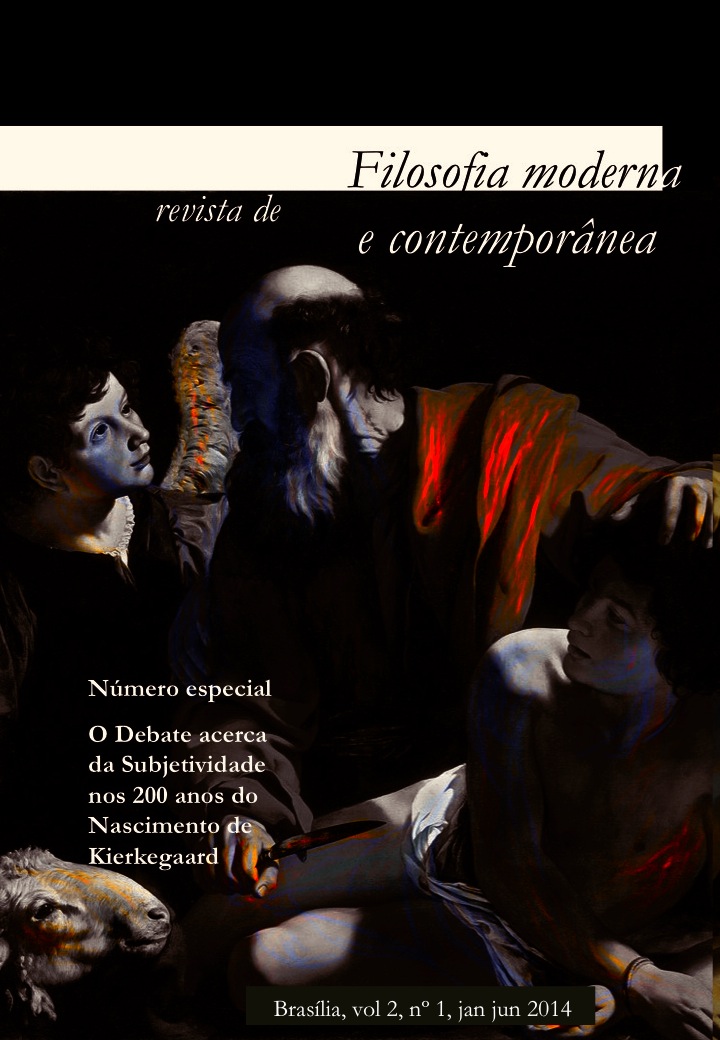Dialectic, Language and Genealogy: on the program of Negative Dialectics Adorno
DOI:
https://doi.org/10.26512/rfmc.v2i1.12444Keywords:
T.W. Adorno, I. Kant, G.W.F Hegel, Dialectics, LanguageAbstract
The paper aims at delineating the general framework of Adorno’s Negative Dialectics in a historical perspective.To begin with, I consider the role played by Adorno’s interpretation of Kant’s epistemolog y in the way Adorno reformulates, in his critique of Hegel, the relation between dialectics and ontology (1). Then I argue that Adorno’s comprehension of dialectics is connected to a concept of language inspired by some strategies developed in ‘genealogical tradition’ (2)
Downloads
References
ADORNO, T. e HORKHEIMER, M. Dialética do Esclarecimento: Fragmentos Filosóficos. Jorge Zahar Editora: Rio de Janeiro, 1985.
ADORNO, T. Dialética Negativa. Jorge Zahar Editora: Rio de Janeior, 2009.
ADORNO, T. Einführung in die Dialektik. Suhrkamp: Frankfurt, 2010.
ADORNO, T. Kierkegaard. EDUNESP: São Paulo, 2010.
ADORNO, T. Progresso. In: ADORNO, T.W. Palavras e sinais. Modelos críticos 2. Petrópolis/RJ: Vozes., 1995.
BERNSTEIN, J. “Negative Dialektik. Begriff und Kategorien III. Adorno zwischen Kant und Hegel”. In: HONNETH, A. Negative Dialektik. Akademie Verlag: Berlin, 2006.
BRISTOW, W. Hegel and the Transformation of Philosophical Critique. Clarendon P r e s s : O x f o r d , 2 0 0 7 . H a r v a r d University Press: London, 2003.
BUCK-MORSS, S. The Origin of Negative Dialectics. Theodor W. Adorno, Walter Benjamin, and the Frankfurt Institute. The Free Press: New York, 1977.
DEWS, P. Logics of Disintegration: Post-structuralist Thought and the Claims of Critical Theory. Verso: London, 1987.
HABERMAS, J. Discurso Filosófico da Modernidade. São Paulo: Martins Fontes, 2001.
______. Teoria do Agir Comunicativo (volume 1: Racionalidade da ação e racionalização social). São Paulo, Martins Fontes, 2012.
HEGEL, G.W.F. Werke in 20 Bände. Frankfurt am Main: Suhrkamp, 1970.
HONNETH, A. Negative Dialektik. Akademie Verlag: Berlin, 2006.
HONNETH, A. Pathologien der Vernunft: Geschichte und Gegenwart der kritischen Theorie. Suhrkamp: Frankfurt am Main, 2007.
HOULGATE, S. Hegel, Nietzsche and the Criticism of Metaphysics. Cambridge University Press: New York, 1986.
JAMESON, F. Late Marxism: Adorno or the Persistence of the Dialectic. Verso: London, 1990.
JAMESON, F. Postmodernism or, the Cultural L o g i c o f L a t e C a p i t a l i s m. D u k e University Press: Durham, 1991.
KANT, I. Kants Werke ”“ Akademie Textausgabe. Berlin: Walter de Gruyter, 1968.
KLEIN, R. Adorno-Handbuch: Leben - Werk ”“ Wirkung. Metzler, 2011. (568)
LÖWITH, K. From Hegel to Nietzsche: The Revolution in Nineteenth-Century Thought. Columbia University Press: New York, 1991.
MURPHY, P. ; ROBERTS, D. Dialectic of Romanticism: a Critique of Modernism. Continuum: New York, 2006.
NIETZSCHE, F. Werke: Kritische Gesamtausgabe. hg. G. Colli u. M. Montinari. Berlin/New York: DTV & Walter de Gruyter, 1975.
______. Sämtliche Werke: Kritische Studienausgabe in 15 Bänden. Hg. G. Colli und M. Montinari. Berlin/New York: Walter de Gruyter/DTV, 1999.
O’CONNOR, B. Adorno’s Negative Dialectic: Philosophy and Possibility of Critical Rationality. The MIT Press: London, 2004.
OTTMANN, H. Nietzsche Handbuch. J.B. Metzler Verlag: Stuttgart, 2000.
RUSH, F. “Conceptual Foundations of Early Critical Theory”. In: RUSH, F. Cambridge Companion to Critical Theory. Cambridge University Press: Cambridge, 2004.
SAAR, M. Genealogie als Kritik: Geschichte und Theorie des Subjekts nach Nietzsche und Foucault. Campus Verlag: Frankfurt, 2007.
SHERRATT, Y. Adorno is Positive Dialectic. Cambridge University Press: Cambridge, 2002.
SHERRATT, Y. Continental Philosophy of Social Science. Hermeneutics, Genealogy and Critical Theory from Greece to the Twenty-First Century. Cambridge University Press: Cambridge, 2006.
STEGMAIER, W. Nietzsches Genealogie der Moral.WissenschaftlicheBuchgesellschaft: Darmstadt, 1994.
STEWART, J. “Kierkegaard and Hegel on Faith and Knowledge”. In: HOULGATE, S. A Companion To Hegel. Wiley-Blackwell: Oxford, 2011.
Downloads
Published
How to Cite
Issue
Section
License
Copyright for articles published in this journal is retained by the authors, with first publication rights granted to the journal. By virtue of their appearance in this open access journal, articles are free to use, with proper attribution, in educational and other non-commercial settings.


